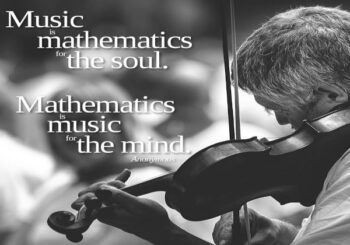By John Patterson
Staff Writer for Wake Up World
In a world where education constantly seeks innovative ways to engage and inspire young minds, a comprehensive analysis spanning nearly five decades has unveiled an exciting discovery. Researchers have found that music, when integrated into mathematics lessons, significantly enhances children’s mathematical skills and overall performance.
[pro_ad_display_adzone id=”110028″]
This groundbreaking study, conducted by Dr. Ayça Akin from Antalya Belek University, Turkey, sheds light on the symbiotic relationship between music and mathematics, offering a fresh perspective on educational practices. With the aim of fostering a love for numbers and diminishing mathematical anxiety, the integration of music emerges as a powerful tool in educational settings.
The Influence of Music on Mathematical Achievement: Dr. Akin’s research amalgamates data from 55 studies worldwide, encompassing a staggering 78,000 students ranging from kindergartners to university scholars. The study examines three types of musical interventions: standardized music lessons, instrumental musical interventions, and music-maths integrated interventions.
Through a meticulous comparison of pre- and post-intervention math test scores, researchers observed a consistent pattern—the use of music, whether as standalone lessons or integrated into math classes, correlated with significant improvements in mathematical abilities.
Integrated Music-Math Lessons
The Key to Success: Among the various interventions explored, music-maths integrated lessons demonstrated the most substantial impact. An impressive 73% of students who experienced these integrated lessons outperformed their peers who did not partake in any musical intervention. Furthermore, 69% of students who learned to play instruments and 58% of students engaged in standard music lessons exhibited greater mathematical improvement compared to those without musical exposure.
The Synchrony of Mathematics and Music
The study draws attention to the striking parallels between mathematics and music. Both disciplines employ symbols and symmetry, while also demanding abstract thinking and quantitative reasoning. Arithmetic, in particular, lends itself splendidly to musical integration due to its shared foundational concepts, such as fractions and ratios. These concepts find expression in the lengths of musical notes, which can be represented as fractions and combined to compose harmonious bars of music. The fusion of mathematics and music in integrated lessons allows students to forge connections, explore mathematical concepts more deeply, and perceive mathematics through a creative lens.
Enhanced Learning for Younger Pupil
Dr. Akin’s findings reveal that music has a more significant impact on younger students and those grappling with fundamental mathematical concepts. This suggests that integrating music into math lessons during the early stages of education can pave the way for stronger mathematical foundations and foster a lifelong appreciation for both subjects. By leveraging music’s inherent appeal and engaging qualities, educators can dismantle the barriers of anxiety that students may associate with mathematics.
Implications and Collaborative Teaching
While this study emphasizes the efficacy of music-math integration, it is essential to acknowledge the study’s limitations, including the relatively small number of studies available for inclusion. Consequently, factors such as gender, socio-economic status, and duration of musical instruction could not be thoroughly examined.
[pro_ad_display_adzone id=”110030″]
Nonetheless, Dr. Akin’s research provides a persuasive argument for collaborative lesson planning between mathematics and music teachers. By pooling their expertise, these educators can devise lessons that intertwine the two subjects, enabling students to develop a holistic understanding of mathematical concepts and enhancing their academic achievement.
A Harmonious Future
The implications of Dr. Akin’s research are profound, offering educators a fresh perspective on how to elevate mathematical learning experiences for children. By embracing the inherent connection between mathematics and music, schools have the opportunity to revolutionize their teaching methods, fostering a new generation of enthusiastic mathematicians.
Through integrated music-math lessons, students can embark on a captivating journey where mathematical complexities harmoniously merge with melodic symphonies, creating an environment that inspires joy, curiosity, and profound understanding.
As Dr. Akin aptly concludes, “Encouraging mathematics and music teachers to plan lessons together could help ease students’ anxiety about mathematics, while also boosting achievement.” It is through collaboration and innovation that we can orchestrate a future where the union of music and mathematics enhances the educational landscape, nurturing young minds and igniting a passion for knowledge that will resonate for a lifetime.
Reference:
- Ayça Ak?n. Let me make mathematics and music together: A meta-analysis of the causal role of music interventions on mathematics achievement. Educational Studies, 2023; 1 DOI: 10.1080/03055698.2023.2216826
About the author:
John Patterson is an avid writer and researcher who delves into the latest scientific research. With an insatiable curiosity, he translates complex concepts into accessible narratives, allowing readers to embark on a journey of discovery. Through his work, John bridges the gap between experts and the public, igniting curiosity and inspiring meaningful conversations about scientific breakthroughs.
[pro_ad_display_adzone id=”110027″]







